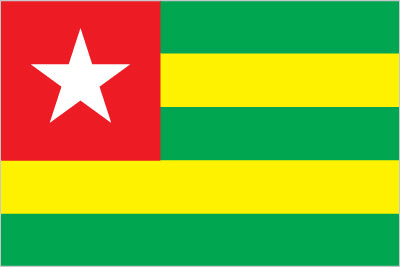Last updated on April 19th, 2019
Togo, officially the Togolese Republic, is a country in West Africa. It has an area of 56,785 square km. Lomé City is its capital and largest city. French is its official language and West African CFA franc (XOF) is its official currency. Its land bordering countries are Ghana, Benin and Burkina Faso. With these facts about Togo, let’s learn more about its history, culture, economy, people, government, poverty and its flag.
Cultural facts
1. Togo and its surrounding regions were known as “the slave coast” between the 16th and the 18th century because Europeans would come to the region in search of slaves.
2. Togo has a rich history of religion. It has 29% Christians, 20% Muslims and 51% indigenous people.
3. Togo has secular celebrations. Some of the celebrations include 1 January – Fete Nationale and 27 April – Independence day. These celebrations open a window for job opportunities and they attract more tourists.
4. Traditional healing methods are widely used in Togo. Each center has an herbalist. Medical treatments usually involve frequent visits to the house of Vodou and the local Fetish priest.
5. The public show of affection is minimal in Togo. Only men and boys are allowed to walk holding hands. Coupling is discretely secret and it is not steered by parents. It is only in some ethnic groups like the Tchama that parents make arrangements for courting.
6. Togolese usually have two to three meals a day and they are very hospitable. Each meal consists a large portion of starch such as maize, cassava, and rice. Proteins served with day meals usually include; goat meat, fish, and beans.
7. Food is not served in ceremonial functions except when carrying out animist rituals when animals are sacrificed, cooked and served. However, beer and gin are essential. The French three or four meal course is served to the wealthy middle class Togolese during functions.
8. The society in Togo was divided according to traditional and non-traditional lines. The kings, Vodou priests, and paramount chiefs are the elite. The educated, business professionals and government officials entail modern elite.
Flag of Togo

Note: uses the popular Pan-African colors of Ethiopia. Credit – CIA
9. Children remain at home till they reach five years of age. Kids go to school for formal education once they cross this age limit.
10. Togo’s population is challenged with parasitic, venereal, intestinal and respiratory health problems.
Togo’s history
11. Togo means ‘house of sea’ in the Ewe language.
12. Togo had a great railway network during the reign of the German. During the outbreak of First World War in 1914, Togo was drawn into a conflict. It was invaded by the British and French armies during the Togo-land campaign. In 1916, the territory was divided into French and British zones and this was made formal in 1922.
13. Togo became independent on 27 April 1960. In a smooth transition, Togo served its constitutional ties with France. It shed its UN trusteeship and became fully independent with Olympio as the president.
14. Olympio’s government was overthrown and he was assassinated in a coup on 13 January 1963. The coup was led by army’s non-commissioned officers who were dissatisfied with the conditions following their discharge from the French army.
15. Grunitzky was the second president of Togo and its third head of state. Two days after Olympio was assassinated, Grunitzky came back to Togo to head the government as prime minister.
Also read: Facts about Benin
16. Gnassingbe Eyadema was the longest-serving president of Togo. He died in 2005. He served for thirty-eight years, after being the longest dictator to hold occupation in Africa, at the time of his death.
17. The Ewe who migrated from Nigeria in the fourteenth century forms the major ethnic group in Togo.
18. Togo was put on the World stage by the national soccer team which reached the FIFA World Cup in 2006.
19. The Portuguese arrived in Togo in the 15th century but did not settle.
20. Slavery was abolished in Togo in the nineteenth century.
Map of Togo

Facts about Togolese people and Togo’s economy
21. Cocoa, coffee, and cotton generate 20% of Togo’s export earnings.
22. Cotton is the most important cash crop.
23. The government contributes to accountability of taxes collected by spending 25.5 percent of gross domestic output in development.
24. Togolese business people inflate prices so as to make handsome profits. So if you are in the country, always bargain for the price and see for yourself how low you can buy the item for.
25. Togo has many limestone mines which have created employment opportunities. The mines have increased Togo’s contribution to Africa export market.
26. The constitution of Togo has does not have well-stipulated laws on the protection of real private property and inheritance.
Continue reading on the next page…
